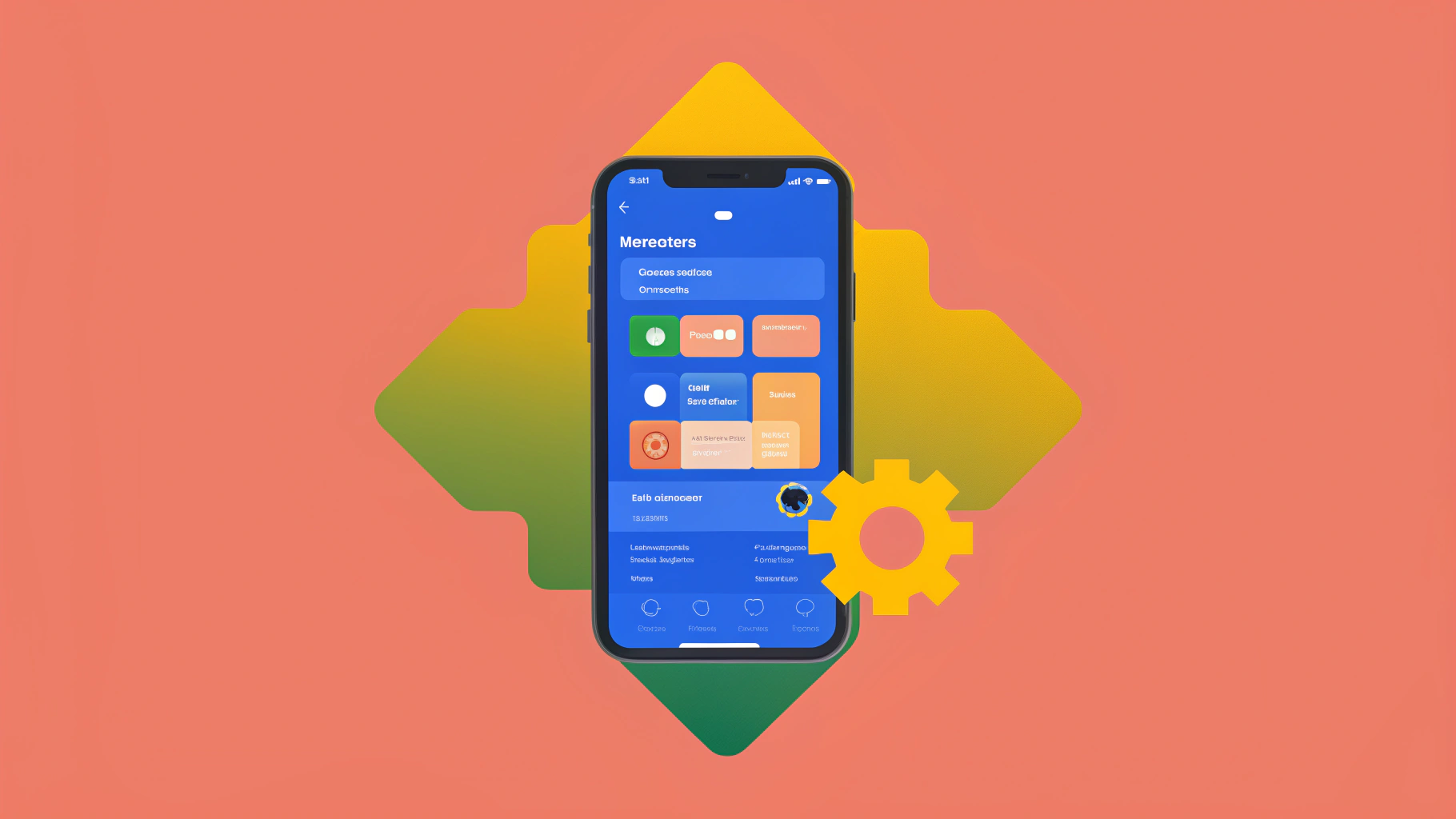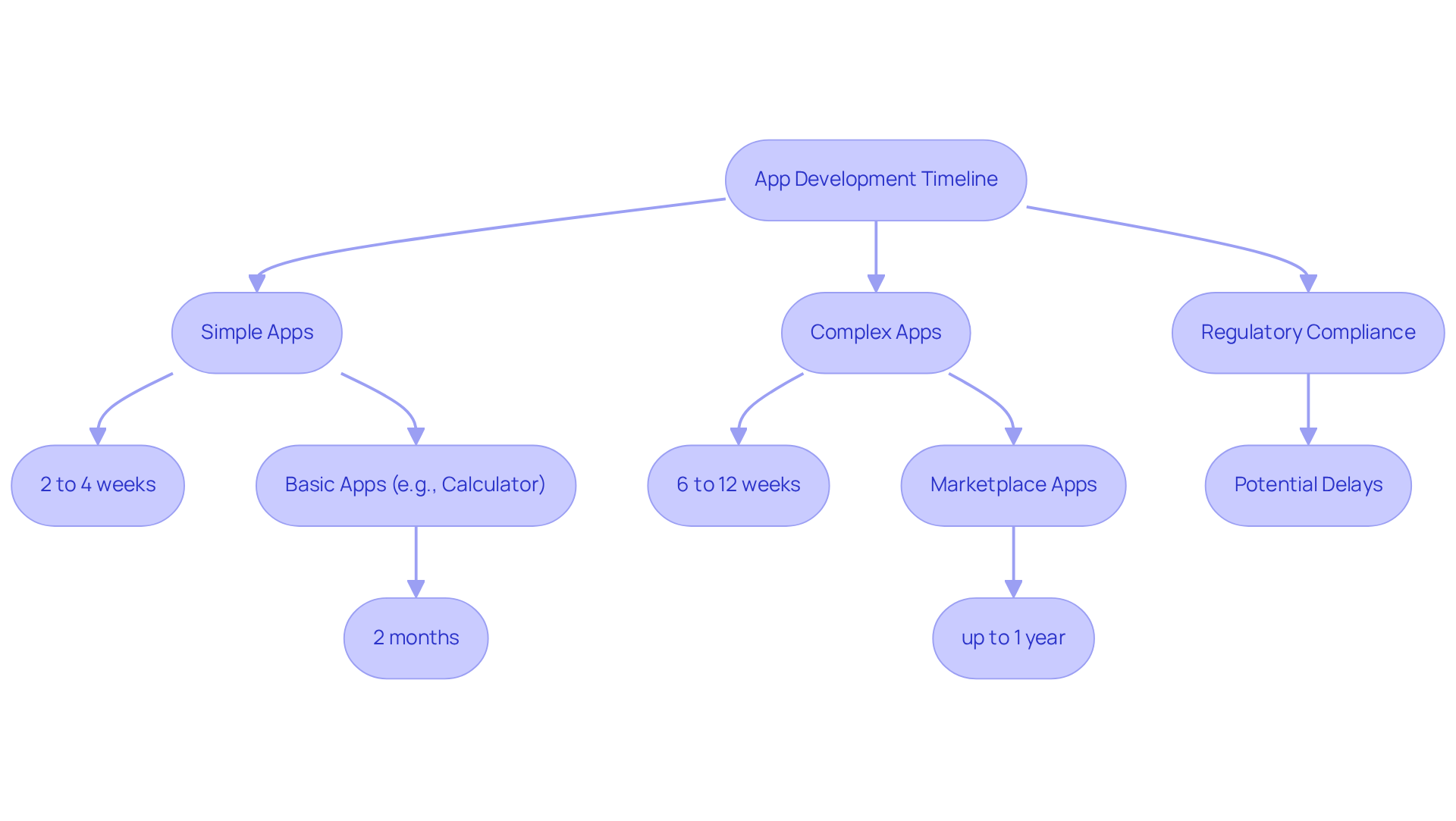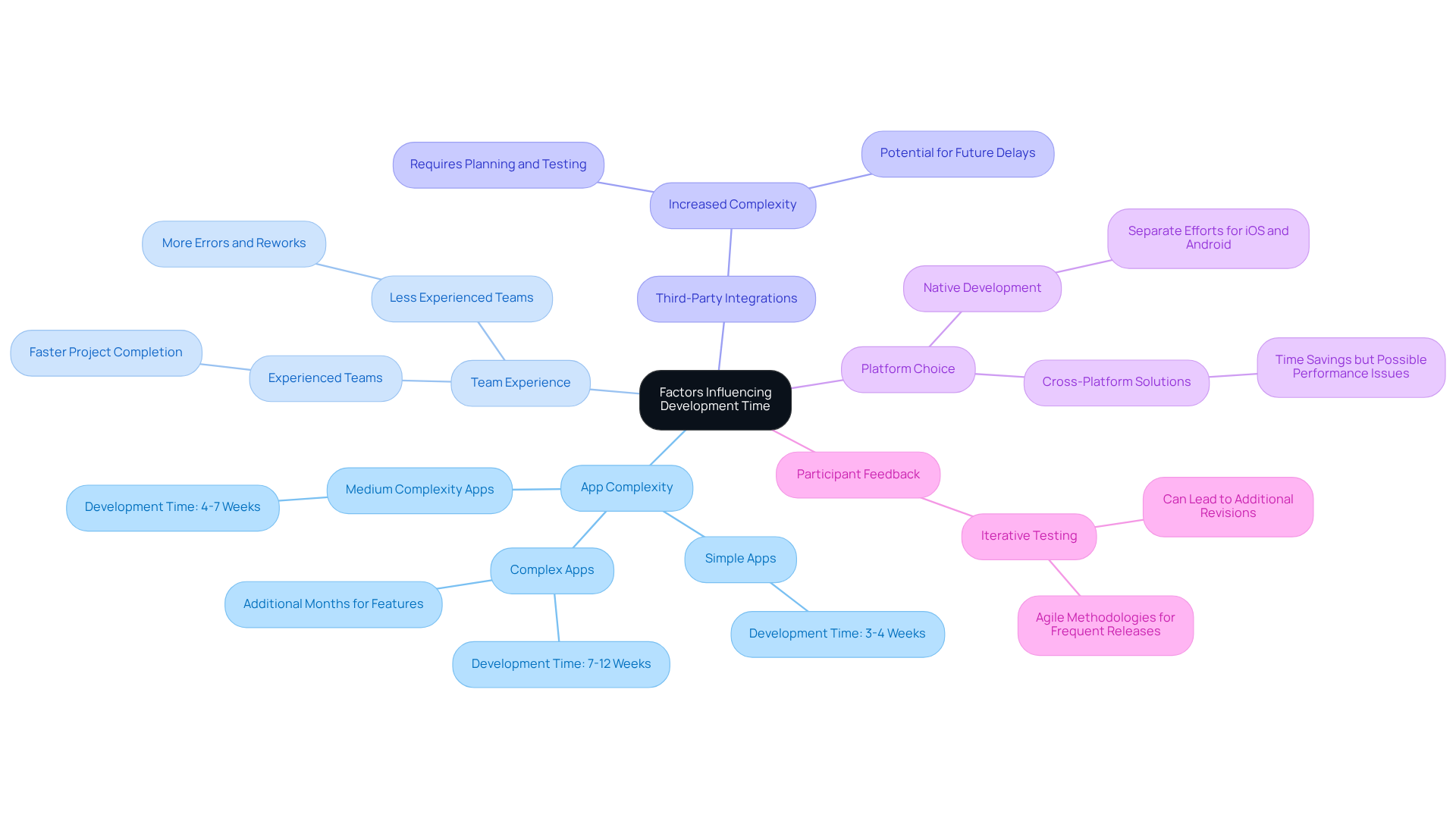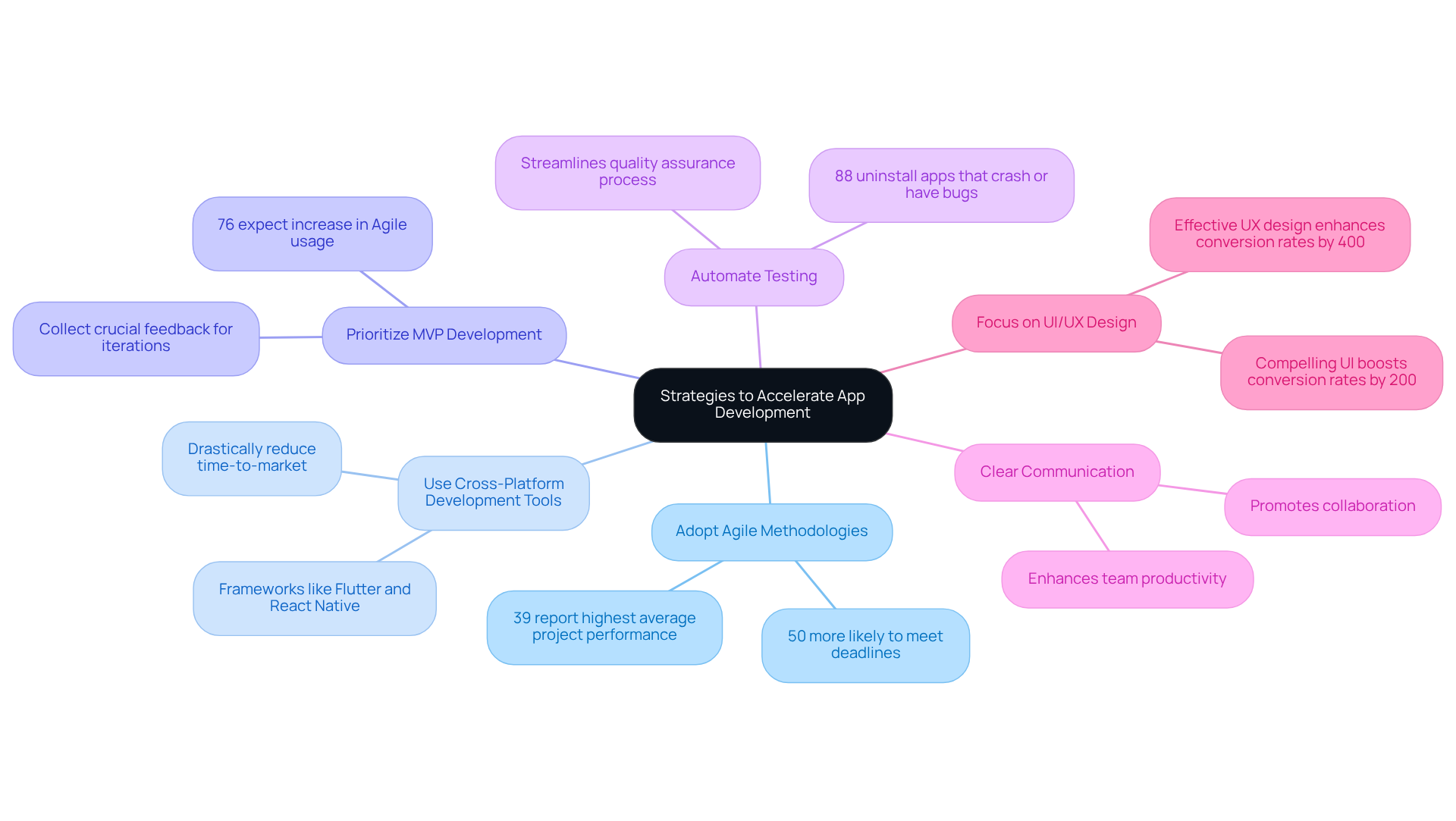AI
our blog
How Long Does It Take to Make an App? Key Factors Explained

Overview
The duration required to develop an application varies considerably due to several factors, including:
- The complexity of the app
- The experience of the development team
- The selected platforms
Simple applications generally take between 2 to 4 weeks to complete, whereas more intricate applications may require 6 to 12 weeks or even longer. Understanding these factors is crucial. Furthermore, effective management practices and the adoption of methodologies such as Agile and cross-platform development can significantly streamline the development process. By implementing these strategies, organizations can enhance their chances of completing projects on time.
Introduction
The journey of app development is often marked by uncertainty, leaving many aspiring creators to ponder a critical question: how long does it truly take to build an app? The timeline for app creation can vary significantly, influenced by a multitude of factors including:
- The app's complexity
- The expertise of the development team
- The chosen platforms for deployment
This article explores the intricacies of app development timelines, providing insights into the essential stages of the process as well as the challenges that may arise. As stakeholders aim to streamline their projects, a pivotal question persists: what strategies can be employed to navigate the complexities of app development and ensure timely delivery?
Understand App Development Timelines
When considering app development, many wonder how long does it take to make an app, as timelines can vary significantly based on several factors, including the complexity of the app, the development team’s experience, and the chosen platform (iOS, Android, or cross-platform). Typically, when considering how long does it take to make an app, straightforward apps can take anywhere from 2 to 4 weeks, while more intricate applications may require 6 to 12 weeks or even longer. For instance, when assessing how long does it take to make an app, a basic app like a calculator might be developed in 2 months, whereas a complex marketplace app could take up to a year.
It is essential to account for regulatory and compliance preparedness during the planning stage, as these elements can profoundly influence timelines and resource distribution. Different industries may have specific compliance requirements that must be addressed proactively to ensure that projects remain on track, thereby avoiding potential delays and budget overruns. By effectively managing compliance requirements, stakeholders can streamline the creation process and significantly enhance the likelihood of a successful launch.

Break Down the App Development Process
The app development process encompasses several critical stages, each characterized by its own timeline and significance:
-
Planning and Research (2-4 weeks): This foundational phase involves defining the app's purpose, identifying the target audience, and outlining core features. Allocating sufficient time to this stage is crucial to understand how long does it take to make an app, as it can prevent significant delays later in the development process.
-
Design (1-2 cycles): During this phase, wireframes and prototypes are developed to illustrate the app's structure and user experience. Effective design is paramount; a well-executed UI/UX can significantly enhance user engagement and satisfaction.
-
Development (3-6 weeks): This stage is the most time-consuming, involving the actual coding and construction of the app according to the design specifications. The complexity of the app greatly influences how long does it take to make an app, with straightforward applications typically requiring 3-4 weeks, while more intricate systems may need up to 6 weeks or longer.
-
Testing (1-2 months): Comprehensive testing is essential to identify and rectify bugs, ensuring the app functions as intended. This phase often includes feedback loops from participants, leading to optimizations that enhance the overall user experience.
-
Launch: Following testing, the app is deployed to app stores. This stage involves monitoring performance and gathering initial feedback from users to address any urgent issues.
-
Post-Launch Maintenance: Regular updates and enhancements based on client feedback are vital for maintaining competitiveness and relevance in the market. This ongoing support may encompass feature enhancements and performance optimizations.
Each stage necessitates meticulous management to ensure the project remains on track. Clear communication and well-defined objectives are instrumental in aligning teams and stakeholders effectively.

Identify Factors Influencing Development Time
Several factors significantly influence how long does it take to make an app.
-
App Complexity: The intricacy of an app, encompassing the number of features and the complexity of its design, directly affects development timelines. More complex apps, such as those with extensive functionalities or intricate user interfaces, can take considerably longer to develop. For instance, when discussing how long does it take to make an app, simple applications typically require 3-4 weeks, medium-complexity applications take 4-7 weeks, and complex applications can extend to 7-12 weeks. Apps needing numerous screens and interactive features may prolong the creation phase by several months compared to simpler applications. As Serge V. aptly states, "The more features your product includes, the more time design, creation, and QA require."
-
Team Experience: The expertise of the project team plays a crucial role in determining timelines. Experienced teams can navigate challenges more efficiently, often completing projects faster than less seasoned counterparts. Their familiarity with best practices and coding standards reduces the chances of errors and reworks, ultimately streamlining the creation process.
-
Third-Party Integrations: Incorporating external APIs or services can introduce additional complexity, potentially extending timelines. While these integrations can enhance functionality, they often require careful planning and testing to ensure compatibility, which can delay the overall project. This complexity can be particularly pronounced if the external APIs change, complicating future updates.
-
Platform Choice: Developing for multiple platforms, such as iOS and Android, can significantly increase the workload. Native applications usually necessitate distinct programming efforts, while cross-platform solutions may provide time savings but can affect performance. The selection of the technology stack also affects the duration, with cutting-edge technologies potentially extending the process due to their complexity.
-
Participant Feedback: Iterative progress based on participant testing is essential for refining the app. However, this process can lead to additional revisions and adjustments, impacting the timeline. Collecting and examining feedback from clients early in the creation cycle can assist in prioritizing features and simplifying future iterations. Agile methodologies can enhance this process by dividing projects into manageable segments, permitting more frequent releases and modifications based on feedback.
By comprehending these factors, stakeholders can more effectively foresee challenges and modify their project plans accordingly, which is crucial for understanding how long does it take to make an app.

Implement Strategies to Accelerate Development
To accelerate app development, consider implementing the following strategies:
- Adopt Agile Methodologies: Agile methodologies facilitate iterative development and allow for rapid adjustments based on user feedback, significantly speeding up the development process. Organizations that embrace Agile are 50% more likely to meet deadlines and budgets, showcasing its effectiveness in enhancing project outcomes. Furthermore, 39% of respondents employing an Agile project management approach report the highest average project performance rate, further emphasizing the benefits of Agile practices.
- Use Cross-Platform Development Tools: Frameworks such as Flutter and React Native enable simultaneous app development for multiple platforms, which can drastically reduce time-to-market. This method not only conserves resources but also expands the potential audience.
- Prioritize MVP Development: Concentrating on building a Minimum Viable Product (MVP) enables teams to launch swiftly and collect crucial feedback from users for subsequent iterations. This strategy aligns with the growing trend of rapid prototyping in the app development lifecycle, with 76% of practitioners expecting an increase in their organization's usage of Agile methodologies.
- Automate Testing: Implementing automated testing tools streamlines the quality assurance process, reducing the time spent on manual testing. This efficiency is essential, as 88% of individuals remove applications that crash or contain bugs, highlighting the necessity for thorough testing.
- Clear Communication: Maintaining open lines of communication among team members is vital for quickly addressing issues and keeping projects on track. Agile practices promote collaboration, which has been shown to enhance team productivity and alignment with organizational objectives.
- Focus on UI/UX Design: Prioritizing interface and experience design is essential, as compelling UI design can boost conversion rates by 200%. By ensuring that the app is user-friendly and visually appealing, teams can enhance user engagement and retention.
By applying these strategies, teams can enhance their efficiency and significantly reduce how long it takes to make an app.

Conclusion
When embarking on the journey of app development, understanding the timeline is crucial. The duration required to create an app hinges on multiple factors, including its complexity, the expertise of the development team, and the chosen platform. By grasping these elements, stakeholders can better anticipate the time commitment necessary for successful app creation, ensuring a smoother development process.
Key insights reveal that straightforward applications can take as little as 2 to 4 weeks, while more complex projects may stretch to several months or even a year. Essential stages such as:
- Planning
- Design
- Development
- Testing
- Post-launch maintenance
each contribute to the overall timeline. Furthermore, factors like app complexity, team experience, third-party integrations, and iterative feedback significantly influence how long it takes to develop an app.
Ultimately, the significance of efficient app development cannot be overstated. By implementing strategies such as:
- Agile methodologies
- Prioritizing MVP development
- Maintaining clear communication
teams can expedite their processes and enhance project outcomes. As the mobile app landscape continues to evolve, understanding how to navigate these timelines and challenges will be vital for anyone looking to bring a successful app to market. Embracing these practices not only shortens development time but also positions apps for greater success in a competitive environment.









